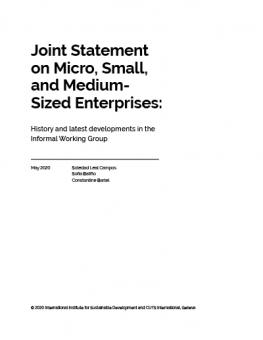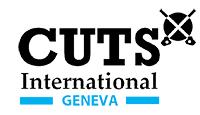
Joint Statement on Micro, Small, and Medium-Sized Enterprises: History and latest developments in the Informal Working Group
This brief outlines the history and developments of MSME-related discussions in the World Trade Organization (WTO) context, looking specifically at MSME-related issues at the WTO as well as in other forums and contexts.
This brief was prepared for the virtual seminar on the Joint Statement Initiative (JSI) devoted to micro, small, and medium-sized enterprises (MSMEs), held on May 8, 2020.
The brief outlines the history and developments of MSME-related discussions in the World Trade Organization (WTO) context, looking specifically at MSME-related issues at the WTO as well as in other forums.
This material has been produced with funding by U.K. aid from the U.K. Government. It was produced as part of the TAF2+ Umbrella Grant Project on New WTO Issues, which covers the areas of investment facilitation, electronic commerce, and MSMEs.
The Umbrella Grant is a project of the Trade and Investment Advocacy Fund (TAF2+) and is implemented by the International Institute for Sustainable Development, in consortium with CUTS International, Geneva; BKP Economic Advisors; and InterAnalysis. The papers for our Geneva Seminars and virtual seminars benefited from the review of our editorial oversight committee, including Nathalie Bernasconi-Osterwalder, Rashid Kaukab, Julien Grollier, Rashmi Jose, Susan Joekes, and Julian Mukiibi. Views expressed in the publication are the authors' own and do not necessarily reflect HM Government’s official positions or those of TAF2+.

Additional downloads
You might also be interested in
Agreement on Climate Change, Trade and Sustainability: A landmark pact for trade and sustainability
The ACCTS pact, signed by Costa Rica, Iceland, New Zealand, and Switzerland, aligns trade and environmental policies, tackling fossil fuel subsidies, eco-labels, and green trade.
Addressing Carbon Leakage: A toolkit
As countries adopt ambitious climate policies, this toolkit examines strategies to prevent carbon leakage—when production and emissions shift to nations with weaker climate policies—and explores the trade-offs of each approach.
IISD Trade and Sustainability Review, December 2024
This edition of the IISD Trade and Sustainability Review presents four expert perspectives on how agricultural support and subsidies can promote sustainability in developing and least developed countries.
Why Trade Matters in the Plastic–Pollution Treaty Negotiations
The global push to end plastic pollution by 2040 highlights the critical intersection of trade and environmental action, with upcoming INC-5 negotiations focusing on reducing plastic production, consumption, and waste within a fair and effective international framework.